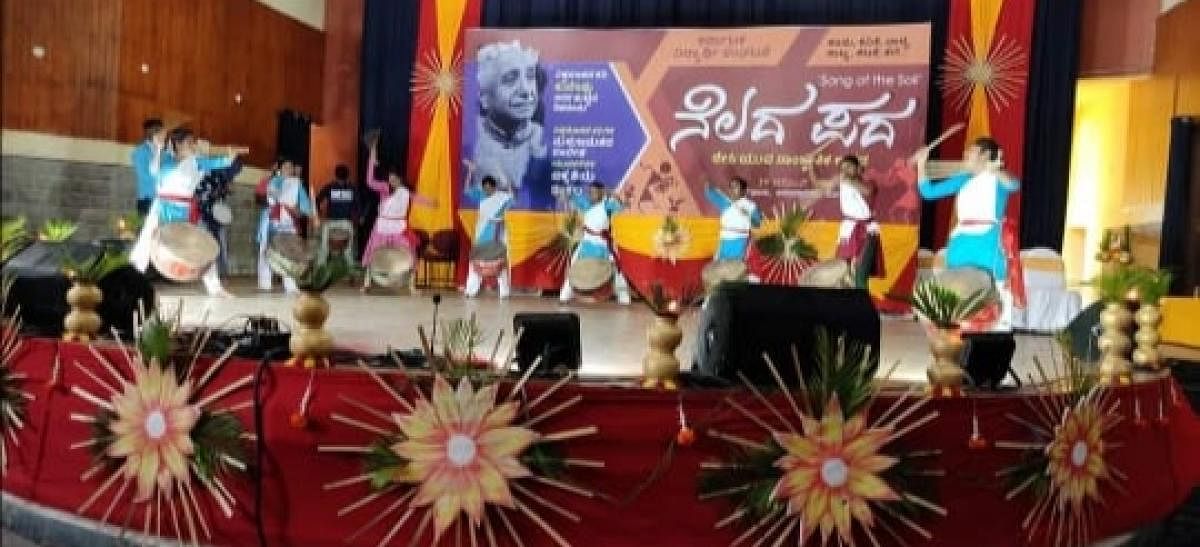Taking up the 'nagari' and breaking stereotypes

On a bright, sunny day in 2013, the Mahila Munnade, a group of women working on women’s rights, gathered for a meeting at Kalappa Layout in Mandya. They were poised to speak out on issues such as violence against women, stereotypes and patriarchal social norms. As they began to speak, the making of the nagari, a folk instrument made by some families in the layout, flowed into the conversation.
By the end of the discussion, they decided to try the instrument and break the stereotypes linked to the nagari.
The nagari is a percussion instrument. It is tied around the waist, and sound is produced by beating against the leather surface of the instrument, traditionally made from animal skin. It weighs more than 25 kg.
Nagaris were mostly played by people from the Dalit community. Furthermore, the instrument was played only by men, as it was considered heavy for women. Mahila Munnade troupe decided to challenge these perceptions.
The art troupe, Mahila Munnade Kala Tanda, decided to learn the instrument. The team of 18 women learnt the instrument in a span of 7 days. Today, they have performed in more than 120 events across Karnataka.
Poornima G, state secretary of Mahila Munnade, says, “We were determined to learn the instrument and so we did.”
Emphasising the need to break the stereotypes and gender roles assigned to women, Poornima adds, “Take the nagari, for instance. Mere physical reasons do not stop us from playing it.”
Addressing stereotypes does not just mean standing up to baseless norms but, also requires a collective effort to change perspectives, she explains.
Commitment
The nagari team has women from a range of communities and age groups. One such member is Shailaja, a homemaker. Inspired by her, her daughter Kousalya too joined the team.
Shailaja believes that parents need to address the outdated perspectives that may be observed and imbibed by their children. “Patriarchy is not taught, but it is learnt. We are conditioned to look at things in a certain way, but we need to break that and learn new things,” she explains.
Setting an example is important, she adds. “If my daughter plays the instrument, girls of her age will change their notion that they are not capable of playing this instrument,” Shailaja says.
The troupe performs in events supporting farmers, social causes and women’s issues. They have set a ground rule of not performing in any events that include political leaders.
The hurdles
It is never easy to take the road less travelled, especially one that deviates from societal norms.
The troupe faced scepticism from many when they first started training in nagari. “People made sarcastic and negative comments,” says Mallige Sirimane, a member of the group, adding that the traditionalists were particularly upset by their decision to play the instrument. “But the number of people who stood by us, as well as our drive to learn was far greater than that,” she adds.
Learning the instrument was also physically taxing. “By the time we finished learning, we had swollen legs, muscle pain and bruises on our bodies, but we knew we could do it,” says Jyothi, a team member.
Biases came to the fore when these women performed on stage. While the troupe has made some progress, there are still significant obstacles — prejudices that remain entrenched. “One of the performers faced multiple rejections of marriage proposals owing to her association with our group and nagari playing,” says Poornima.
The silver lining
The significance of women entering this space and learning to play the nagari is twofold — it preserves an art form and teaches inclusivity. “We aim at transcending the barriers placed on us historically,” Poornima says.
After the Mandya women learned to play and performed at a number of events, women from Mysuru have formed a team too. They have learnt to play the nagari and now stage performances.
Deccan Herald is on WhatsApp Channels | Join now for Breaking News & Editor's Picks